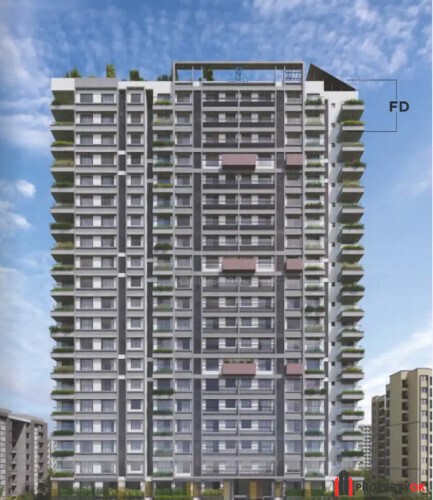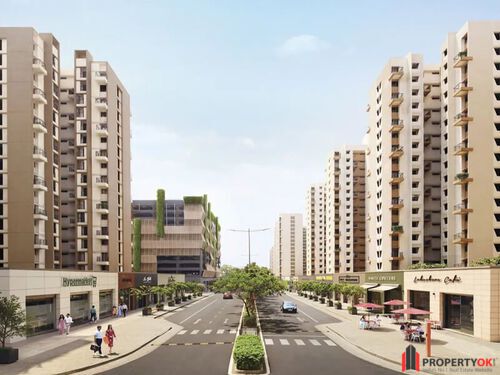When considering property investments in Maharashtra’s booming real estate market, potential buyers often focus on location, amenities, and pricing while overlooking crucial legal aspects that could make or break their investment.

Understanding the Venus Skky City Project Background

Located in Village Bhopar, Taluka Kalyan, District Thane, this expansive development spans 72,480 square meters of land. The Venus Skky City dombivli address encompasses multiple survey numbers, creating a complex web of land ownership and legal documentation that raises several concerns for potential investors.
The Venus Skky City project foundation rests on land acquired through numerous transactions involving multiple original landowners, creating a complicated ownership structure that has undergone several transformations over the past decade. While documented through Maharashtra Real Estate Regulatory Authority (MahaRERA) records, this complex ownership history presents potential legal vulnerabilities that buyers should carefully evaluate.
Explore this blog to uncover the legal issues surrounding Purva Panorama.
Purva Panorama Legal Issues: Is Your Investment at Risk?
Verified Ownership Trail Enhances Legal Security for Buyers
The Concerning Pattern of Rapid Ownership Changes
The land comprising Venus Skky City has experienced multiple ownership transfers within a relatively short timeframe, beginning with original landowners like Prabhakar Shantaram Patil, Janabai Gopal Patil, and several other landowners. These properties were initially consolidated through agreements for sale registered between 2010-2011 with Sub-Registrar Kalyan-4.
The concern lies in the rapid succession of ownership changes. The land was first transferred to M/s. Alag Nirmaan Pvt. Ltd. (later known as HET Developers Pvt. Ltd.) through conveyance deeds executed between 2011-2013. Subsequently, in 2021, the entire project was transferred to M/s. Venus Nirvaan LLP, through a sale deed dated January 6, 2021.
Legal Implications of Complex Survey Number Distribution
The venus skky city dombivli encompasses fifteen different survey numbers, each with varying areas and ownership histories. Survey No. 239/7 covers the largest area at 9,600 square meters, while smaller parcels like Survey No. 51/6 comprise only 180 square meters. This fragmented land acquisition approach creates potential legal challenges including:
Boundary Disputes: With multiple survey numbers involved, there’s an increased risk of boundary disputes between adjacent landowners or even within the project itself. Each survey number may have different historical claims or encumbrances that could surface later.
Documentation Inconsistencies: Managing legal documentation across fifteen different survey numbers increases the probability of missing or inconsistent paperwork, which could create title defects in the future.
Compliance Complications: Different survey numbers may have varying compliance requirements, development permissions, or restrictions that could affect the project’s overall development and delivery timeline.
Legally Approved Land Conversion and Mutation Back Buyer Trust

Legally Sanctioned Non-Agricultural Land Use Boosts Buyer Confidence
While Mutation Entry No. 2448 confirms non-agricultural use for the land, the timing and process of this conversion raise questions about procedural compliance. The Urban Land Ceiling (ULC) exemption for Survey No. 239/6 through Mutation Entry No. 1785 suggests that some portions of the land were previously subject to urban land ceiling regulations.
The conversion from agricultural to non-agricultural use often involves complex regulatory approvals, environmental clearances, and compliance with local development plans. Any gaps in this conversion process could lead to legal challenges from regulatory authorities or affected parties.
Mutation Entry Irregularities
The project shows multiple mutation entries (No. 1929, 1980, 1926, 1987, 1928, 2448) confirming various ownership changes. While these entries provide a paper trail, the frequency and timing of these mutations could indicate underlying issues such as:
Delayed Documentation: Multiple mutation entries might suggest that proper documentation was completed retrospectively, which could indicate procedural shortcuts or compliance gaps.
Revenue Record Discrepancies: Frequent changes in revenue records often correlate with disputes or challenges in establishing a clear title, which could affect buyer confidence and property marketability.
Developer Track Record and Financial Stability

HET Developers to Venus Nirvaan LLP Transition
The transition from M/s. Alag Nirmaan Pvt. Ltd. (HET Developers Pvt. Ltd.) to M/s. Venus Nirvaan LLP in 2021 raises questions about the original developer’s capability or financial stability. Such mid-project transitions often occur due to:
Financial Distress: Original developers may sell projects when facing cash flow problems or inability to secure construction financing.
Legal Complications: Developers sometimes transfer projects to avoid legal liabilities or regulatory issues associated with the original entity.
Strategic Restructuring: While sometimes legitimate, such transfers can also be used to avoid accountability for previous commitments or to start with a clean slate regarding regulatory compliance.
Limited Track Record of Current Developer
Venus Nirvaan LLP, being the current project owner, appears to have acquired Venus Skky City as their primary development venture. Limited track record in real estate development poses several risks:
Execution Capability: New developers may lack the experience and resources needed for successful project completion.
Financial Backing: Without proven financial strength, there’s increased risk of project delays or incomplete delivery.
Regulatory Compliance: Inexperienced developers may struggle with complex regulatory requirements, leading to approval delays or legal issues.

30-Year Search Period Inadequacy
While the legal consultant has provided a 30-year title search report from 1992-2021, this timeframe may be insufficient given India’s complex land ownership history. Several potential issues remain unaddressed:
Pre-1992 Claims: Historical claims, inheritance disputes, or government acquisitions prior to 1992 might not be reflected in the search report.
Oral Traditions: In rural areas like Village Bhopar, traditional land use rights or community claims may not be documented in official records but could emerge as legal challenges.
Government Policy Changes: Changes in land use policies, environmental regulations, or development guidelines since 1992 might create retroactive compliance issues.
Encumbrance Certificate Concerns
Although the title is declared “clear, marketable, and free from encumbrances” as of October 7, 2021, this declaration has several limitations:
Point-in-Time Assessment: The clear title declaration represents the status at a specific date and may not account for subsequent developments or emerging issues.
Limited Scope: Encumbrance certificates may not capture all forms of legal liabilities, including environmental obligations, labour disputes, or regulatory violations.
Professional Liability: The legal opinion is only as reliable as the thoroughness of the investigation and the professional competence of the consultant.
Regulatory Compliance and Approval Status Questions
MahaRERA Registration Complexities
While the project data is available through MahaRERA records, several compliance aspects remain unclear:
Environmental Clearances: For a project spanning 72,480 square meters, comprehensive environmental impact assessments and clearances are typically required.
Local Authority Approvals: Municipal corporation approvals, fire safety clearances, and utility connections for such a large project involve multiple regulatory touchpoints.
Development Plan Compliance: Adherence to local development plans, floor space index regulations, and zoning requirements needs continuous monitoring.
Construction and Delivery Timeline Risks
The complex ownership history and multiple survey numbers could significantly impact project delivery timelines through:
Approval Delays: Coordinating approvals across multiple survey numbers and previous ownership entities can create bureaucratic delays.
Construction Challenges: Physical development across fragmented land parcels may face technical and logistical challenges.
Legal Clearances: Any title disputes or regulatory challenges could halt construction activities indefinitely.
Investment Assessment for Venus Skky City Dombivli
Financial and Legal Risk Factors
Potential investors should carefully evaluate several risk factors before committing to Venus Skky City Dombivli:
Liquidity Risk: Complex legal history may make future resale difficult, as potential buyers might be deterred by the intricate ownership background.
Completion Risk: Developer transition, regulatory complexities, and fragmented land ownership increase the risk of project delays or non-completion.
Appreciation Risk: Legal uncertainties can suppress property value appreciation, making it a poor investment choice compared to projects with cleaner titles.
Due Diligence Recommendations
Before investing in venus skky city photos or visiting the project site, potential buyers should undertake comprehensive due diligence including:
Independent Legal Verification: Engage independent legal experts to verify all title documents, approvals, and compliance certificates beyond the developer-provided documentation.
Financial Health Assessment: Investigate the current developer’s financial stability, past project delivery record, and capability to complete the project as promised.
Regulatory Status Verification: Confirm current status of all required approvals, environmental clearances, and compliance with local development regulations.
Market Analysis: Compare similar projects in the area with cleaner legal status to ensure competitive pricing and investment potential.
Conclusion
The Venus Skky City project presents numerous legal red flags that potential investors cannot afford to ignore. While the project may offer attractive pricing or amenities, the complex ownership history, developer transitions, and multiple survey number complications create significant investment risks.
The fragmented nature of land acquisition, multiple ownership transfers, and relatively new developer involvement suggest that buyers should exercise extreme caution before making any financial commitments. The legal complexities surrounding Venus Skky City could lead to prolonged disputes, delivery delays, or even complete project abandonment.
Smart investors should prioritise projects with cleaner legal status, established developers with proven track records, and simpler ownership structures. In Maharashtra’s dynamic real estate market, numerous alternative investment opportunities exist without the legal complications present in this particular development.
FAQS
1. What are the main legal issues surrounding Venus Skky City Dombivli?
The project faces title irregularities, rapid ownership changes, fragmented land parcels, and procedural gaps in land use conversion.
2. Why is the developer transition a concern for Venus Skky City investors?
The project changed hands mid-way, raising doubts about financial stability, regulatory compliance, and the new developer’s execution capability
3. Should buyers invest in Venus Skky City Dombivli in 2025?
Buyers are advised to exercise extreme caution and seek independent legal verification due to multiple legal, title, and compliance risks.
Disclaimer: This analysis is based on information obtained from MahaRERA website records and should not be considered as legal advice. Potential investors should consult qualified legal professionals before making any investment decisions.

 Thank You
Thank You










